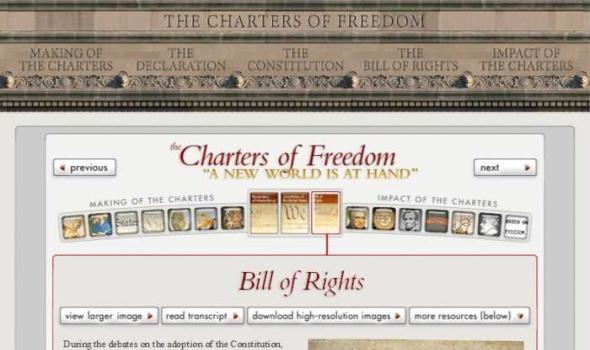Category: Text, English, Government documents, The U.S. National Archives and Records Administration, United States
Results
Treasures of Congress An exhibit in the National Archives Rotunda, Washington, DC January 21, 2000—February 19, 2001 Few institutions have been as central to the course of American history as the U.S. Congress. Most of the great issues in our national life have been played out there, and many of our most memorable political figures have served in the House of Representatives or the Senate. Congress's pivotal position was built into the American system in 1787.
During the debates on the adoption of the Constitution, its opponents repeatedly charged that the Constitution as drafted would open the way to tyranny by the central government. Fresh in their minds was the memory of the British violation of civil rights before and during the Revolution. They demanded a "bill of rights" that would spell out the immunities of individual citizens.
Drafted by Thomas Jefferson between June 11 and June 28, 1776, the Declaration of Independence is at once the nation's most cherished symbol of liberty and Jefferson's most enduring monument. Here, in exalted and unforgettable phrases, Jefferson expressed the convictions in the minds and hearts of the American people. The political philosophy of the Declaration was not new; its ideals of individual liberty had already been expressed by John Locke and the Continental philosophers.
In 1761, fifteen years before the United States of America burst onto the world stage with the Declaration of Independence, the American colonists were loyal British subjects who celebrated the coronation of their new King, George III. The colonies that stretched from present-day Maine to Georgia were distinctly English in character although they had been settled by Scots, Welsh, Irish, Dutch, Swedes, Finns, Africans, French, Germans, and Swiss, as well as English. As English men and women, the American colonists were heirs to the thirteenth-century English document, the Magna Carta, which established the principles that no one is above the law (not even the King), and that no one can take away certain rights.


















